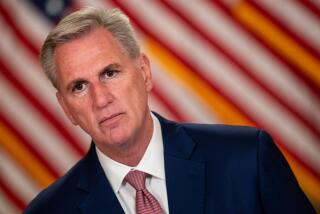Canada’s New Budget Gets High Marks : Economy: Markets respond favorably to tough package. Lower bond rating still possible.
- Share via
TORONTO — Canada’s new deficit-denting budget won endorsements from the financial community Tuesday as the Canadian dollar and the Toronto stock market opened higher and interest rates dropped.
Market analysts were nearly unanimous in their praise for what is described as the biggest cut in government spending in 50 years. “It’s something Newt Gingrich would like,” said Michael McCracken, an Ottawa-based analyst.
“In general, it’s the toughest budget we’ve seen in Canada since World War II, and that’s because these cuts are real,” said Patti Croft, senior economist with CIBC Wood Gundy, a Toronto brokerage house.
Croft and others also applauded the conservative economic assumptions built into the $117-billion budget, which rolls back government subsidies to agriculture, business and social programs and promises to eliminate 45,000 jobs--14% of the federal government work force--in three years.
All this may not be enough, however, to keep Moody’s Investor Services from downgrading Canada’s bond rating, which it announced it was reviewing two weeks ago. Croft noted that while the government has a credible plan for reducing the deficit to 3% or less of the total economy by the end of fiscal 1997, it has charted no course beyond that to a zero deficit.
And even with the cuts--which will total about $9.6 billion over two years--Canada’s accumulated federal debt will remain unchanged at more than 73% of the gross domestic product. When the debts of the provinces are added, it approaches 100% of GDP. That debt ratio is second only to Italy among the Group of Seven top economic powers.
Tough as the new budget is, Canadians will feel more pressure next year, when federal spending for health care, higher education and welfare drops and responsibility for those services transfers to the provinces.
“Canada is going to see a series of tough budgets,” Croft said.
The budget prompted boos in some quarters. The union representing government employees announced that members will consider a work-to-rules slowdown to protest the projected elimination of federal jobs. No strike vote has been called “at this time,” a union official said.
Even critics concede that Prime Minister Jean Chretien’s government was pressed into cuts by restive international investors, who hold 40% of Canada’s national debt. In December, investors unnerved by the destabilization of the Mexican peso also turned on the Canadian dollar, driving it near an all-time low and forcing up interest rates.
“We are an economy with a gun to its head. . . . It’s the gun of the financial markets,” said Robert Fairholm, chief economic forecaster for DRI Canada in Toronto. “We need foreign investors to be confident in Canada.”
Following Monday afternoon’s budget presentation, the Canadian dollar rose to a high for the year in overnight trading and opened Tuesday at 71.93 U.S. cents. It then drifted down slightly to 71.86 cents in profit taking.
The Bank of Canada rate, pegged at a quarter of a percentage point above the average yield on 90-day treasury bills, dropped to 8.02%, from 8.38% the week before.
More to Read
Sign up for Essential California
The most important California stories and recommendations in your inbox every morning.
You may occasionally receive promotional content from the Los Angeles Times.












